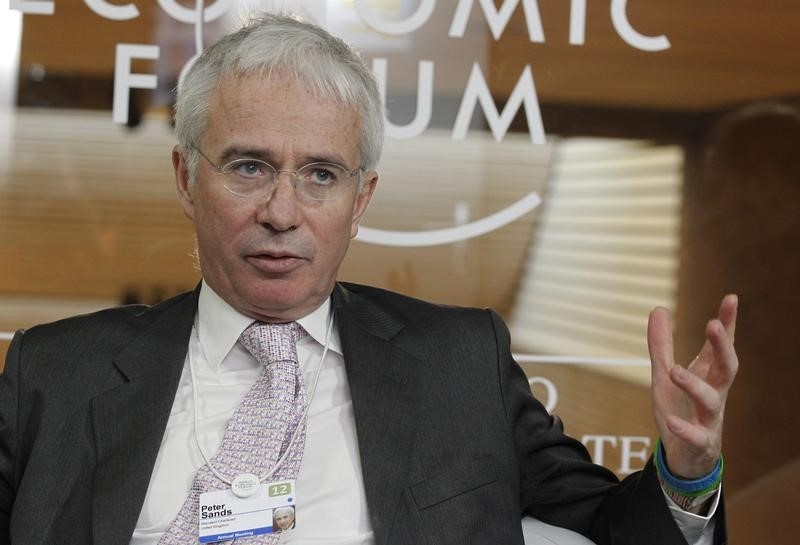By Steve Slater and Carmel Crimmins
LONDON (Reuters) - Standard Chartered (L:STAN) is being urged to plan for life beyond Peter Sands after a strategy update last month failed to restore confidence in the chief executive among some investors.
After eight years, Sands is one of the longest serving CEOs at a major global bank. But a series of problems in the last two years and a rise in bad debts have raised questions about his ability to steer the bank through a low growth era.
The bank will be in the regulatory spotlight for at least three more years after U.S. prosecutors on Tuesday extended a period of scrutiny to 2017, following sanction breaches for which it was first punished in 2012.
Three of the bank's biggest 30 shareholders told Reuters Sands should be replaced, probably next year. Two more top 30 investors said they were unhappy with its governance and wanted changes, although they did not say Sands had to go.
The investors asked not to be named.
Standard Chartered disputed that major shareholders were calling for Sands, or Chairman John Peace, to leave.
"There are no plans to replace Peter or John or new succession plans being worked on for either. The overwhelming view of major shareholders who have spoken to us is that the bank needs stability in its management team as the bank repositions for growth," the bank said in a statement.
It was slower growth in Asia and the costly U.S. fines for breaching sanctions on Iran in 2012 that burst Standard Chartered's bubble after 10 straight years of record earnings.
A 32 percent fall in the bank's shares this year has wiped more than 10 billion pounds off its value. Shares are down a quarter since Sands became CEO in 2006. They trade at about 0.8 times book value, compared to about 1 times book for HSBC (L:HSBA), and 1.3 times at Lloyds (L:LLOY).
"What that's saying is the market has no confidence in (management)," said David Fergusson, chief investment officer of Woodside Holdings Investment Management, a Singapore-based fund management company that has a small stake in the bank.
While some investors want Peace to go as well, they would prefer him to leave after Sands to avoid too much disruption.
Naguib Kheraj, formerly finance director at Barclays (L:BARC), has been floated as a potential chairman or CEO, although it is uncertain if he would want either, industry sources said. Kheraj joined Standard Chartered as a non-executive director in January and is heavily involved with the Aga Khan's charities. Kheraj declined comment.
FALL FROM GRACE
Some investors said management took on more risks with loans to keep growing strongly and are paying for it now that Asian economies are stalling.
Bad debts in the first nine months of 2014 swelled 52 percent from a year earlier, partly due to a big jump in loans to mining and commodities firms since 2008. Some analysts say the bank may have to cut its dividend.
Investors concerned about governance said the bank's 19-person board is unwieldy and may not have challenged management enough. In May, more than 40 percent of shareholders voted against the bank's pay plan.
"We need to have some confidence the issues have been picked up and understood by the board, and know they are doing something about it," one top 20 investor said.
Sands acknowledged some of the problems during a trip to Hong Kong to brief investors last month and laid out $400 million in annual cost cutting plans. But some investors said that did not go far enough.
"If this management had taken seriously what investors were saying we would have seen a real refresh of the strategy and some concrete targets on when to get there, and we didn't see that," said Susan Sternglass Noble, who runs AXA Framlington Financials fund at AXA Investment Management, one of the bank's top 30 investors.
"The slides for the investor trip showed some mea culpa, they recognize recent performance has been disappointing. But I think what is not very visible is a recognition that many of the issues that have arisen seem to be a direct result of the strategy and execution of the previous five years," she said.
The turning point for Sands, 52, a former McKinsey consultant who grew up in Asia and advised the UK during the financial crisis, came in August 2012, when Standard Chartered was fined $667 million for breaching U.S. sanctions on Iran.
That took executives by surprise and rocked internal confidence, sources said.
It was fined again in August by New York's bank regulator, and last week Standard & Poor's cut its credit rating for the first time in 20 years.
Top management have responded by meeting investors more regularly, sources said, and are also considering changing their long-time banking advisors. Tom Schrager, managing director at U.S. investment fund Tweedy, Browne, a top 20 investor, said Standard Chartered had been slow adjusting but was now "moving in the right direction" and Sands should be given time.

"They are in a tough spot at the moment, which gives opportunities to people like us to buy more," Schrager said, saying he had topped up his shareholding.
(Additional reporting by Saeed Azhar in Singapore and Simon Jessop, Nishant Kumar and Matt Scuffham in London; editing by Alexander Smith and David Clarke)